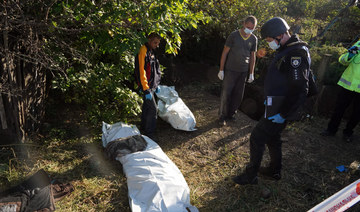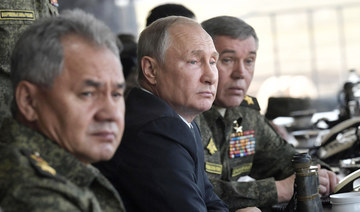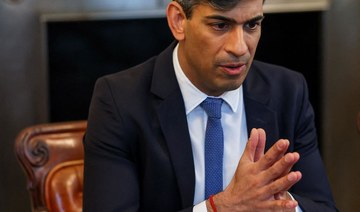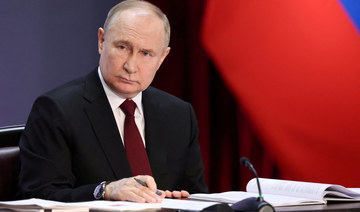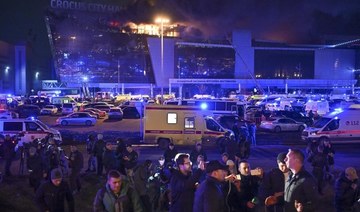KYIV: Ukrainian troops on Sunday successfully pressed their swift counteroffensive in the northeastern part of the country, even as a nuclear power plant in the Russia-occupied south completely shut down in a bid to prevent a radiation disaster as fighting raged nearby.
But Russia struck back at Ukraine’s infrastructure Sunday night, causing widespread blackouts, with the Kharkiv and Donetsk regions among those without power, officials said.
Kyiv’s action to reclaim Russia-occupied areas in the Kharkiv region forced Moscow to withdraw its troops to prevent them from being surrounded, leaving behind significant numbers of weapons and munitions in a hasty retreat as the war marked its 200th day on Sunday.
Ukrainian President Volodymyr Zelensky mocked the Russians in a video address Saturday night, saying “the Russian army in these days is demonstrating the best that it can do — showing its back.”
He posted a video of Ukrainian soldiers hoisting the national flag over Chkalovske, another town reclaimed in the counteroffensive.
Yuriy Kochevenko, of the 95th brigade of the Armed Forces of Ukraine, tweeted a video from what appeared to be the city center of Izyum. The city was considered an important command and supply hub for Russia’s northern front.
“Everything around is destroyed, but we will restore everything. Izyum was, is, and will be Ukraine,” Kochevenko said in his video, showing the empty central square and destroyed buildings.
While most attention focused on the counteroffensive, Ukraine’s nuclear energy operator said the Zaporizhzhia nuclear power plant, Europe’s largest, was reconnected to Ukraine’s electricity grid, allowing engineers to shut down its last operational reactor to safeguard it amid the fighting.
The plant, one of the 10 biggest atomic power stations in the world, has been occupied by Russian forces since the early days of the war. Ukraine and Russia have traded blame for shelling around it.
Since a Sept. 5 fire caused by shelling knocked the plant off transmission lines, the reactor was powering crucial safety equipment in so-called “island mode” — an unreliable regime that left the plant increasingly vulnerable to a potential nuclear accident.
The International Atomic Energy Agency, the UN nuclear watchdog that has two experts at the site, welcomed the restoration of external power. But IAEA Director-General Rafael Grossi said he is “gravely concerned about the situation at the plant, which remains in danger as long as any shelling continues.”
He said talks have begun on establishing a safety and security zone around it.
In a call Sunday with Russian President Vladimir Putin, French President Emmanuel Macron urged the withdrawal of Russian troops and weaponry from the plant in line with IAEA recommendations.
In fighting, Ukraine’s military chief, Gen. Valerii Zaluzhnyy, said its forces had recaptured about 3,000 square kilometers (1,160 square miles) since the counteroffensive began in early September. He said Ukrainian troops are only 50 kilometers (about 30 miles) from the Russian border.
One battalion shared a video of Ukrainian forces in front of a municipal building in Hoptivka, a village just over a mile from the border and about 19 kilometers (12 miles) north of Kharkiv.
Kharkiv Gov. Oleh Syniehubov said Ukrainian troops have reclaimed control of more than 40 settlements in the region.
Widespread power outages were reported Sunday night by Ukrainian media, with the Kharkiv and Donetsk regions completely blacked out, while Dnipropetrovsk, Zaporizhzhia and Sumy partially lost power, Zelensky said.
“Russian terrorists remain terrorists and attack critical infrastructure. No military facilities, only the goal of leaving people without light and heat,” he tweeted.
Ukrainian officials said Russia hit Kharkiv TEC-5, the country’s second-biggest heat and power plant.
Kharkiv Mayor Igor Terekhov called the power outage “revenge by the Russian aggressor for the successes of our army at the front, in particular, in the Kharkiv region.”
Later in the evening some power had been restored. None of the outages were believed to be related to the shutdown of the reactors at the Zaporizhzhia plant.
The Ukrainian General Staff said Russian forces had left several settlements in the Kherson region as Ukrainian forces pressed the counteroffensive. It did not identify them.
An official with the Russian-backed administration in the city of Kherson, Kirill Stremousov, said on social media that the city was safe and asked everyone to stay calm.
The Russian pullback marked the biggest battlefield success for Ukrainian forces since they thwarted a Russian attempt to seize Kyiv near the start of the war. The Kharkiv campaign came as a surprise for Moscow, which had relocated many of its troops from the region to the south in expectation of a counteroffensive there.
In trying to save face, the Russian Defense Ministry said Saturday the withdrawal from Izyum and other areas was intended to strengthen Moscow’s forces in the neighboring Donetsk region to the south. The explanation was similar to how Russia justified pulling back from Kyiv earlier this year.
Igor Strelkov, who led Russia-backed forces when the separatist conflict in the Donbas erupted in 2014, mocked the Russian Defense Ministry’s explanation of the retreat, suggesting that handing over Russia’s own territory near the border was a “contribution to a Ukrainian settlement.”
The retreat angered Russian military bloggers and nationalist commentators, who bemoaned it as a major defeat and urged the Kremlin to step up its war efforts. Many criticized Russian authorities for continuing with fireworks and other lavish festivities in Moscow that marked a city holiday on Saturday despite the debacle in Ukraine.
Putin attended the opening of a huge Ferris wheel in a Moscow park on Saturday, and inaugurated a new transport link and a sports arena. The action underlined the Kremlin’s narrative that the war it calls a “special military operation” was going according to plan without affecting Russians’ everyday lives.
Pro-Kremlin political analyst Sergei Markov criticized the Moscow festivities as a grave mistake.
“The fireworks in Moscow on a tragic day of Russia’s military defeat will have extremely serious political consequences,” Markov wrote on his messaging app channel. “Authorities mustn’t celebrate when people are mourning.”
In a sign of a potential rift in the Russian leadership, Ramzan Kadyrov, the Kremlin-backed head of Chechnya, said the retreat resulted from blunders by the Russian brass.
“They have made mistakes and I think they will draw the necessary conclusions,” Kadyrov said. “If they don’t make changes in the strategy of conducting the special military operation in the next day or two, I will be forced to contact the leadership of the Defense Ministry and the leadership of the country to explain the real situation on the ground.”
US Secretary of State Antony Blinken and the head of NATO cautioned Friday the war would likely go on for months, urging the West to keep supporting Ukraine through what could be a difficult winter.
Ukraine’s battlefield gains would help as the Biden administration seeks continued financial support of the war effort from Congress and Western allies, said Daniel Fried, a former US ambassador to Poland and now a distinguished fellow at the Atlantic Council in Washington.
“The Biden administration policy is evolving in a direction that is more and more justified,” Fried said. “More investment in Ukraine, more confidence in Ukrainian ability to prevail, a greater willingness to push the Russians — that looks like a good bet. I’m not saying Ukraine is going to win or that the West is going to succeed. It’s still an open question. But the investment in the possibility of strategic success is more and more justified.”
Sen. Tim Kaine, a Virginia Democrat and member of the Senate Foreign Relations Committee, called Ukraine’s advances very encouraging, adding: “We and our allies must keep standing with Ukraine. Putin needs to recognize that the only way out is to end his failed war.”
Russian forces retreat amid Ukrainian counteroffensive
https://arab.news/nk6z8
Russian forces retreat amid Ukrainian counteroffensive
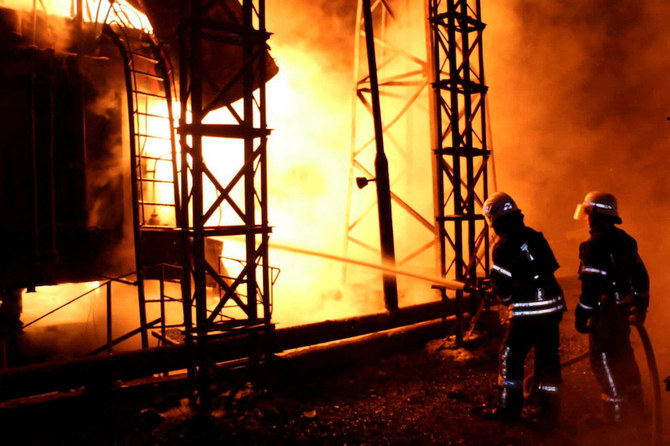
- Kyiv’s action to reclaim Russia-occupied areas in the Kharkiv region forced Moscow to withdraw its troops
- Widespread power outages were reported Sunday night by Ukrainian media
Rights concerns, costs undermine Turkiye-EU migrant deal, say auditors
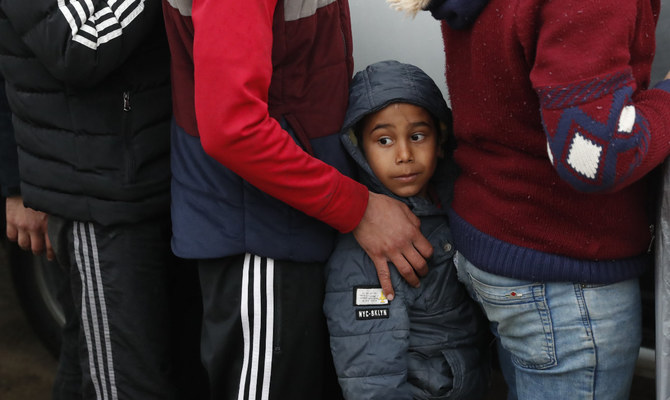
- EU Ombudsman Emily O’Reilly has launched an inquiry into human rights guarantees under the bloc’s new migration deal with Tunisia
BRUSSELS: Turkiye’s poor human rights record and economic factors are undermining the effectiveness of the European Union’s migration deal with Ankara, EU auditors said on Wednesday.
Under the 2016 deal, Ankara agreed to take back migrants who had crossed from its territory to Europe in return for EU aid to help fund more than four million refugees on Turkish soil.
The EU, which faces elections in June for the European Parliament in which illegal migration promises to be a big issue, has sealed agreements similar to the Turkiye scheme with Tunisia, Egypt, Mauritania and others.
In their report, the EU auditors raised concerns about the ability of non-governmental organizations (NGOs) to operate projects, as envisaged under the 6 billion euro ($6.4 billion) deal, given Turkiye’s authoritarian turn since a failed coup in 2016 and its crackdown on dissent.
“The operating situation of NGOs has continuously deteriorated since 2015 and has been exacerbated in the context of the unsuccessful... coup in Turkiye, where NGOs subsequently were targeted through various legislation,” it said.
The European Court of Auditors (ECA) report also cited the difficulty of managing the EU aid in the context of Turkiye’s economic downturn and Ankara’s “backsliding on the rule of law and fundamental rights.”
The report said the European Commission, the EU’s executive, had failed to provide an adequate analysis of costs and that it was unclear what would happen once the aid ended.
“The facility is beneficial for refugees and host communities but we would still like to see improvements in terms of demonstrating impact, ensuring sustainability, and value for money,” said Bettina Jakobsen, who led the ECA report.
Rights groups and some politicians have long accused the EU of neglecting human rights in its drive to curb illegal migration.
“This leads to the EU focusing less on issues that should be of relevance such as the neglect of human rights,” said Florian Trauner, a professor at the Brussels School of Governance.
EU Ombudsman Emily O’Reilly has launched an inquiry into human rights guarantees under the bloc’s new migration deal with Tunisia.
US, Russia set for a showdown at UN over nuclear weapons in space
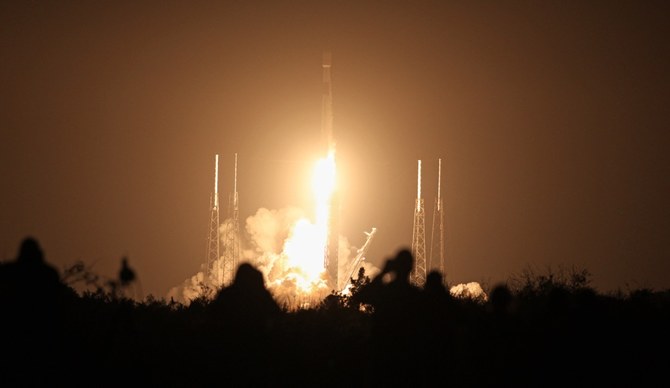
- The White House says Russia has not yet deployed such a weapon.
UNITED NATIONS/WASHINGTON: The United States and Russia are set to face off over nuclear weapons in space on Wednesday at the United Nations Security Council, which is due to vote on a US-drafted resolution calling on countries to prevent an arms race in outer space.
Russia is expected to block the draft resolution, said some diplomats. The US move comes after it accused Moscow of developing an anti-satellite nuclear weapon to put in space, an allegation that Russia’s defense minister has flatly denied.
US Ambassador to the UN Linda Thomas-Greenfield and Japan’s UN Ambassador Yamazaki Kazuyuki said in a joint statement on Friday that they have been negotiating with Security Council members on the draft text for six weeks.
The text affirms the obligation of states to comply with the Outer Space Treaty and calls on countries “to contribute actively to the objective of the peaceful use of outer space and of the prevention of an arms race in outer space.”
The 1967 Outer Space Treaty bars signatories – including Russia and the United States – from placing “in orbit around the Earth any objects carrying nuclear weapons or any other kinds of weapons of mass destruction.”
Russia and China are planning to first put an amendment to a vote in the council. The amendment echoes a 2008 proposal by the pair for a treaty banning “any weapons in outer space” and threats “or use of force against outer space objects.”
The amendment is not expected to be adopted, said diplomats. The amendment and the draft resolution each require at least nine votes in favor and no vetoes by Russia, China, the United States, Britain or France to be adopted.
“Without our amendment, based on the General Assembly resolution adopted in December 2023, the text tabled by the US will be unbalanced, harmful and politicized,” deputy Russian UN Ambassador Dmitry Polyanskiy told Reuters, adding that it would also undermine the Outer Space Treaty legal regime.
Polyanskiy said “all questions relating to this sphere should be considered by the full membership of States Parties to this Treaty and not by the UN Security Council members only.”
US intelligence officials, according to three people familiar with their findings, believe the Russian capability to be a space-based nuclear bomb whose electromagnetic radiation if detonated would disable vast networks of satellites.
White House National Security Council spokesman John Kirby has said Russia has not yet deployed such a weapon.
Russian President Vladimir Putin said in February that Russia was against the deployment of nuclear weapons in space.
Governments have increasingly viewed satellites in Earth’s orbit as crucial assets that enable an array of military capabilities on Earth, with space-based communications and satellite-connected drones in the war in Ukraine serving as recent examples of the outsized role of space in modern warfare.
Russia invaded neighboring Ukraine in February 2022.
Google fires at least 20 more workers who protested its $1.2bn contract with Israel
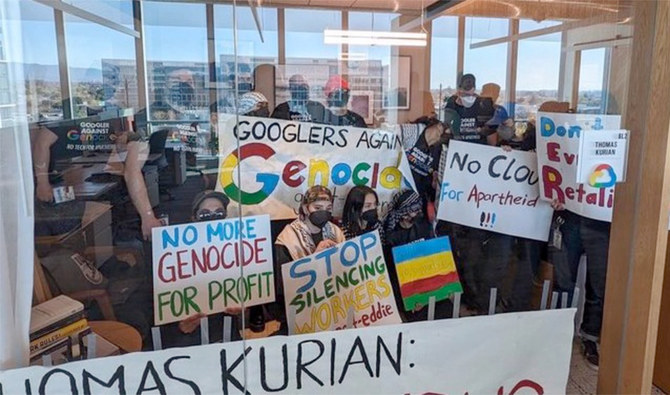
NEW YORK: Google fired at least 20 more workers in the aftermath of protests over technology the company is supplying the Israeli government amid the Gaza war, bringing the total number of terminated staff to more than 50, a group representing the workers said.
It’s the latest sign of internal turmoil at the tech giant centered on “Project Nimbus,” a $1.2 billion contract signed in 2021 for Google and Amazon to provide the Israeli government with cloud computing and artificial intelligence services.
Workers held sit-in protests last week at Google offices in New York and Sunnyvale, California. The company responded by calling the police, who made arrests.
The group organizing the protests, No Tech For Apartheid, said the company fired 30 workers last week — higher than the initial 28 they had announced.
Then, on Tuesday night, Google fired “over 20” more staffers, “including non-participating bystanders during last week’s protests,” said Jane Chung, a spokeswoman for No Tech For Apartheid, without providing a more specific number.
“Google’s aims are clear: the corporation is attempting to quash dissent, silence its workers, and reassert its power over them,” Chung said in a press release. “In its attempts to do so, Google has decided to unceremoniously, and without due process, upend the livelihoods of over 50 of its own workers.”
Google said it fired the additional workers after its investigation gathered details from coworkers who were “physically disrupted” and it identified employees who used masks and didn’t carry their staff badges to hide their identities. It didn’t specify how many were fired.
The company disputed the group’s claims, saying that it carefully confirmed that “every single one of those whose employment was terminated was personally and definitively involved in disruptive activity inside our buildings.”
The Mountain View, California, company had previously signaled that more people could be fired, with CEO Sundar Pichai indicati ng in a blog post that employees would be on a short leash as the company intensifies its efforts to improve its AI technology.
Britain’s home secretary touts UK-Rwanda migrant deportation deal during visit to Italy

- Deal, in which Britain will pay Rwanda to process the migrants, is aimed at deterring people from crossing the English Channel from France
- It is similar in some basic aspects to Italy’s controversial pact to outsource the processing of asylum-seekers to Italian-run centers in Albania
ROME: Britain’s home secretary on Tuesday touted Britain’s migrant deportation deal with Rwanda as a “new and creative” deterrent to an old and growing problem. But he said he took seriously criticism by the UN refugee agency that it violates international law.
Home Secretary James Cleverly visited Italy, ground zero in Europe’s migration debate, hours after the UK Parliament approved legislation to enable the government to deport some people to Rwanda who enter Britain illegally.
The deal, in which Britain will pay Rwanda to process the migrants, is aimed at deterring people from crossing the English Channel from France. It is similar in some basic aspects to Italy’s controversial pact to outsource the processing of asylum-seekers to Italian-run centers in Albania.
Human rights groups have said both deals, forged by conservative governments amid anti-migrant sentiment among voters, violate the rights of migrants that are enshrined in international refugee conventions.
On Tuesday, the UN High Commissioner for Refugees said the UK-Rwanda deal is “not compatible with international refugee law” because it uses an asylum model “that undermines global solidarity and the established international refugee protection system.”
Cleverly defended the deal as a necessary response to a problem that has outgrown the international institutional way of processing migrants. He said Britain will not tolerate people smugglers determining who arrives on British soil.
“People-smuggling mass migration has changed (and) I think demands us to be constantly innovating,” he told a gathering at the Institute of International Affairs, a Rome-based think tank.
He said he took seriously the UNCHR criticism and said Britain was a law-abiding country.
“Of course we will respect the UN enormously,” he said when asked about the UNHCR criticism. “We take it very, very seriously. Doesn’t mean to say we always agree with their assessment. But we will, of course, look at that.”
Cleverly visited the Italian coast guard headquarters on Tuesday and on Wednesday is to visit the Sicilian island of Lampedusa, where tens of thousands of migrants have arrived after crossing the Mediterranean Sea on boats setting off from northern Africa.
Lampedusa is closer to Africa than the Italian mainland and is often the destination of choice for migrants, whose numbers reached 157,652 new arrivals in Italy last year.
The numbers arriving in Italy so far this year are actually way down, presumably thanks to Italy’s European Union-endorsed agreement with Tunisia to stem departures. As of Tuesday, 16,090 migrants had arrived by sea in Italy so far this year, compared to 36,324 in this period last year.
Spain has actually outpaced Italy so far this year in terms of migrant sea arrivals, with 16,621 arriving this year as of April 15, the last available date.
In Britain, the numbers pale in comparison to the southern Mediterranean, even during peak periods: In 2022, the number of people arriving in Britain from across the Channel reached 45,774, though last year the number dropped to 29,437.
Ukraine suspends consular services abroad for men of fighting age

- Ukraine’s foreign affairs ministry “announced a temporary suspension of accepting new applications for consular services” for men between 18 and 60
- It made an exception for documents allowing Ukrainians to return to Ukraine
KYIV: Ukraine authorities on Tuesday suspended consular services for men of fighting age living abroad, after announcing measures to bring them home amid manpower shortages in the army fighting Russia.
Ukraine’s army has been struggling to hold frontlines, partly due to a lack of soldiers over two years into Russia’s invasion.
Ukraine’s foreign affairs ministry “announced a temporary suspension of accepting new applications for consular services” for men between 18 and 60.
It made an exception for documents allowing Ukrainians to return to Ukraine.
The move would likely oblige Ukrainian men to return from abroad to undergo administrative procedures that were previously available abroad.
The government has already adopted a mobilization law, due to come into force on May 18, that toughens penalties against draft dodgers and obliges men to keep their military registration up-to-date.
The ministry said men would be able to access consular services once the law came into force and “after updating their military registration.”
“Male citizen of Ukraine aged 18 to 60 with valid military registration documents will have full access to consular services,” the ministry said.
Ukrainian men have been forbidden to leave the country since the invasion began, apart from a few exceptions.
But some lived away before the war began, and Ukrainian media estimates that thousands more illegally fled the country.




